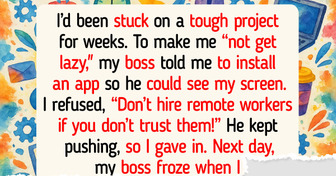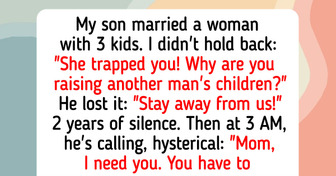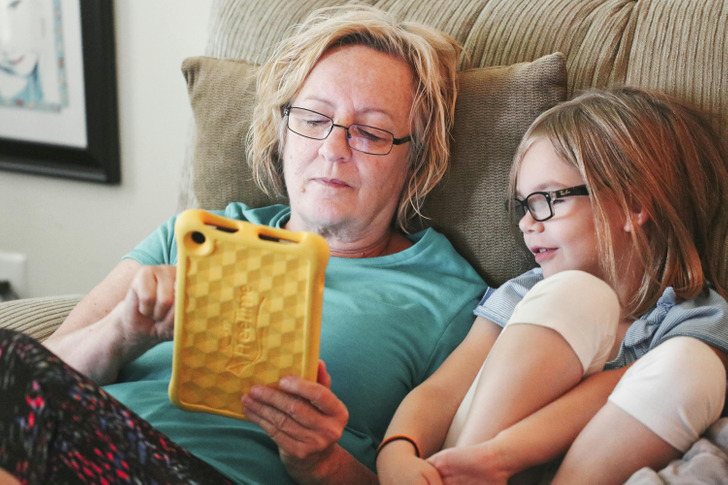I saw a similar situation when teaching in NYC. At a PTA meeting, a student refused to walk, sit or introduced the mom. He later told me that she embarrasses him with her fashion and voice. I asked him, " who pays the rent and bills"
I Refused to Cover My Grandson Tuition—I’m Done Being Humiliated by Him

Her letter:
Dear Bright Side,
I’m feeling very disappointed right now because of something that happened the other day. I went to pick up my grandson at college, wearing a floral sweater I’ve had for years. It always makes me feel cheerful, but when I waved at him, he turned away and walked off. Later, he told me I was “too embarrassing.”
It wasn’t the sweater that hurt; it was the disrespect. For a long time, I’ve been made to feel small in my own family, and this was the breaking point. That same day, I decided I’d had enough. I called the bank and stopped paying his tuition.
A week later, I ran into his mother at a pawn shop. She was selling the jewelry I had given her over the years, gifts I thought would carry meaning and connection. When I asked why, she said, “If you don’t care enough about your grandson, then I won’t care about your family’s jewelry.”
That response said everything. Family should never be about money or material things — it should be about love and respect. Sometimes, the hardest decision you can make is to step back, but it’s also the only way to protect your own dignity.
— Martha
We’re truly sorry this happened to you. Sometimes hurtful words or actions from teens and young adults come from a place of immaturity rather than true intent. Adolescence can be messy, and sadly, situations like this can happen in many families.
That’s why we’ve gathered a few gentle but powerful tips on how to protect your dignity, keep your self-respect, and still leave the door open for healing if your family is ready for it.

So you made it about money but your daughter can't? You could have had a honest conversation with your grandson and daughter about how your feelings were hurt.
- Pick your battles: Not every eye-roll or rude comment deserves a reaction. Sometimes, just walking away quietly says more than yelling back ever could. Save your energy for the stuff that actually matters.
- Let your vibe do the talking: Wearing a funky sweater or giving thoughtful gifts isn’t embarrassing — if anything, it shows personality. Don’t let others’ opinions change how you act; your consistent behavior sends a stronger message than words.
- Teens gonna teen: Adolescents can be... dramatic. They don’t always realize how much their words sting. Keep perspective: their bad comments say more about them than you.

Good for you!! Why should you pay for an ingrates education?? Let him and your DIL figure it out. Tell her if she didn't raise a loser kid maybe you wouldn't mind helping. Let them figure it out and you go on a trip with the $$. Treat YOURSELF!!
- Guard your treasures: Family heirlooms and gifts are meaningful — but if people don’t respect them, it’s okay to put them somewhere safe. You don’t need to make a scene to protect what matters to you.
- Healing happens in slow-mo: Trust and respect don’t come back overnight. Tiny gestures, quiet boundaries, and consistency go a long way. You can step back now, but still leave room for improvement later.
- Leave small openings for connection: Even if you’ve taken a step back, don’t shut the door completely. A smile, a note, or a small act of kindness can slowly remind them of the respect and care you still bring, without compromising your dignity.
- Embrace your quirks: Your floral sweater, your cheerful habits, your gifts — these are parts of who you are. If someone calls them embarrassing, it says more about them than you. Own your uniqueness.
- Pick moments to educate subtly: Instead of lectures, share little lessons through stories or your own actions. It can help young adults reflect without feeling attacked, and keeps the focus on values rather than shame.
- Wear the sweater anyway: Next time you see your grandson, wear it again, not to provoke, but to show that your joy isn’t dictated by his opinion. Small acts of self-expression can quietly reclaim confidence.
- Subtly reclaim your voice: When disrespected, respond with calm, measured words — or even a quiet, confident silence. It signals that you won’t be demeaned without creating extra conflict.
- Invite his mom to collaborate instead of confront: If she is pawning gifts, suggest a low-stakes, shared activity — cooking, baking, or crafting together — to rebuild trust without lecturing.
Moments like this really sting, but they can also be a chance to think about your boundaries, how you communicate, and what love actually looks like. If this story hit close to home, check out this article on a very similar story.
Comments
"Family should never be about money or material things," is what you said. Yet, your reaction to your grandsons disrespect was to instantly retaliate with money. You are a hypocrit ... wonder if that tendancy is why people make you "feel small." Fact is, your life-altering response to a non-life-altering slight proves that you ARE small, that's probably why you feel small. Restore your grandson's education, and try explaining how his actions hurt you in a conversation that won't destroy his life, just as he didn't destroy yours. Although, after your little toddler tantrum, it's unlikely anyone in your family will ever respect you again. But restore the funds anyway ... You'll get what you deserve without taking what he deserves.
Look. You started this snow ball affect with making him making fun of your sweater. That was cheap on his part since you are paying for his college funds. And yes you two need to have a little talk about that. But then you turn around and bitch when his own mother makes pawning your jewelry you gave her to pay for his school about money. You cant have it both ways. All three of you need to have a very serious conversation about the way all three of you are behaving
Wow all these people saying it's on you probably have disrespectful lil shits for kids. My kids would NEVER say their grandmother is embarrassing!! They'd tell me I'm embarrassing but definitely NOT their elderly grandmother!! If my kids did that I would absolutely agree with Grandma and cut the gravy train!! Absolutely team grandma all the way. I can see why kids nowadays act so bratty and rude it starts at HOME! With entitled parents of course they'll have bratty entitled kids. Parents GTFU and be PARENTS!! Discipline is a real thing!!
Related Reads
12 Touching Stories That Capture the Complicated Journey of In-Law Relationships

My Boss Demanded Me to Install Spyware, So I Taught Him What Technology Really Is

15 Success Moments From Strangers That Deserve All the Golden Buzzers in the World

15 Moments That Show Kindness Is Quiet but Changes Everything

12 Life Moments Where Quiet Kindness Played the Main Role

I Refused to Talk to My Parents After They Chose My Ex-Wife Over Me

I Funded My Wife’s Luxury Demands—She Made Me Regret Every Penny

16 Stories That Prove Kindness Still Wins in Our Broken World

I Refuse to Help My Pregnant Sister, and I Don’t Feel Guilty

I Refuse to Forgive My Wife for What She Did to My Son

12 Stories That Prove Real Kindness Is About Actions, Not Words

My Family Always Prioritized My Sister—Then Expected Me to Help Them With Medical Bills



